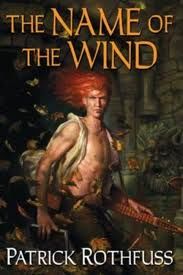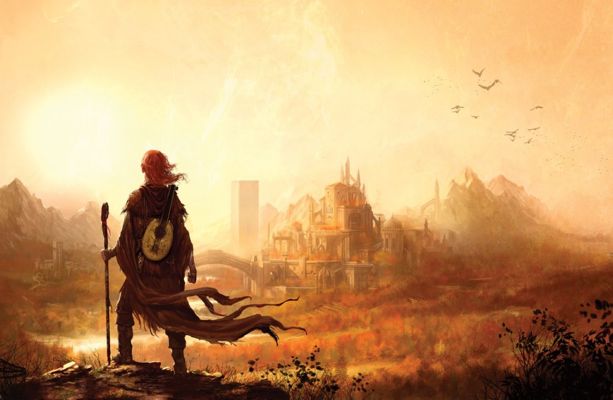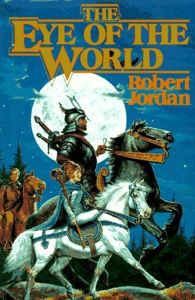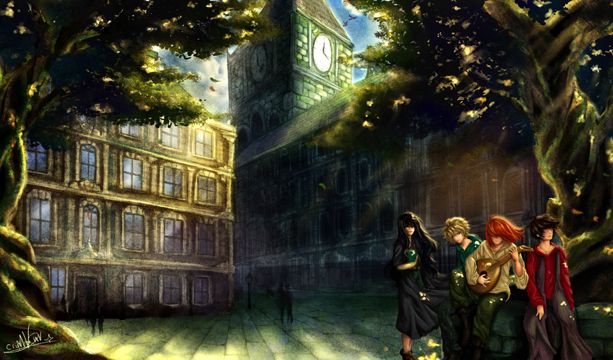 Take the story structure and wizarding world of Harry Potter, add the main character and creative problem-solving skills from Ender’s Game, then stir liberally with a generous helping of ‘epic’ from The Wheel of Time, and you’ll come up with Patrick Rothfuss’ 2007 debut fantasy novel ‘The Name of the Wind’.
Take the story structure and wizarding world of Harry Potter, add the main character and creative problem-solving skills from Ender’s Game, then stir liberally with a generous helping of ‘epic’ from The Wheel of Time, and you’ll come up with Patrick Rothfuss’ 2007 debut fantasy novel ‘The Name of the Wind’.
It tells the story of Kvothe, ‘the most interesting man in the world’ as I saw him described in an amazon review, telling the story of his life in a pub. Yes, really- the whole story is backstory. It’s a guy in a pub telling a story.
For that reason I have avoided even picking the book up since its publication in 2007. How could that be interesting, a story limited to a pub comprised entirely of backstory? It just sounds so static and stodgy.
But I recently read it, genuinely loved it, and I’ll tell you why shortly.
First, the plot.
We pick up the story in a quiet inn where innkeeper ‘Kote’ is polishing bottles. This chap Kote is actually our hero Kvothe, pronounced ‘Quothe’, the badass to end all badasses, who appears to have given up his fighting/magicking/loving laurels after one bad assassination too many, and settled in to pull pints for a living.
Except the town is under siege by scraelings- hollow ceramic spiders, and the greatest storyteller of his age is coming to try and get the true story of Kvothe’s life. For fussy reasons largely to do with Kvothe’s male fae companion (paramour’ There are rumors’) pressing him to do this, Kvothe/Kote agrees to recount his whole story in 3 days.
Does this sound interesting? Not really. On the surface it appears like humdrum D and D epic fantasy. Inn, demon-spiders, story-telling, reluctant hero, adventurers popping in to be given a quest, etc?
Soon enough Kvothe starts in on his grand recitation, the first of three books in The Kingkiller Chronicles, which when complete will cover the three days it takes to tell the story. Day 2 ‘The Wise Man’s Fear’ has already been out for years, though Book 3 shows no signs of appearing soon.
Kvothe’s story begin with his early years as a gypsy-like trouper, until a Harry Potter-ish assault by Jordan-esque dark forces changes everything, and sets his life on an Ender’s Game-like training course toward conflict with his world’s mythical Voldemort/Forsaken/Buggers, the Chandrian (whose names, like Voldemort, you really shouldn’t say aloud). He starts to learn magic, music and fast-talking repartee in order to find out more about them and one day defeat them. He starts to kick ass.
Away we go. Now why did I like it, and why is it like Harry Potter?

Kvothe with his lute on his back, heading back to the University (French cover by Marc Simonetti)
5 ways The Name of the Wind is like Harry Potter.
 Fans of the epic-ness of The Name of the Wind may argue this point vehemently, thinking a similarity to an essentially bloodless, passive and YA hero like Harry is downright insulting. But the similarities are unavoidable, beginning with the fact that Rothfuss being inspired by Harry is entirely possible.
Fans of the epic-ness of The Name of the Wind may argue this point vehemently, thinking a similarity to an essentially bloodless, passive and YA hero like Harry is downright insulting. But the similarities are unavoidable, beginning with the fact that Rothfuss being inspired by Harry is entirely possible.
1- The first Harry Potter book came out in 1997 (so long ago!), while The Name of the Wind came out in 2007, at which time Rothfuss said he’d been mulling over the idea for 10 years. So the timeline for inspiration is fine.
2- Within a few pages of reading I felt like Rothfuss’ voice was fresh, witty, fast-paced, inventive and often delightful- much like J. K. Rowling’s voice in Harry Potter. I don’t think this is easy to do at all, and I admire it greatly. It zipped the story along rapidly and clearly- in contrast to much of epic fantasy- where we expect heaps of stodgy, slow exposition.
In epic fantasy everything must be described. Tiny matters are blown up to seem of great importance. There is very little humor or actual wit. Think of the incredibly slow, stately progression of much of Game of Thrones (of course it has wit). Think of the glacial portentousness of Jordan’s Wheel of Time (no wit), incessantly bogging us down in boring exchanges, lengthy descriptions, and just nothing all that interesting happening.
All those epic crimes are nowhere in this book. It has the lightness of touch that Rowling did in introducing and describing her world. The voice is very similar in depth, pace and color. I always felt about Harry Potter that there was something brilliantly inventive on every single page, moving matters forward or showing something fascinating from her world, and it’s the same here.
3- In terms of grand plot, the stories are nearly identical. Harry’s parents are killed by mythical baddies whom you can’t name, though he survives, then when he comes of age he goes to Hogwarts to become the chosen one for his age, to train to defeat the big bad by the end.
The precise movements and structures are different, but all of that is there in The Name of the Wind. Kvothe’s parents die making him an orphan, he goes to Hogwarts (sorry, the University) and learns how to do magic with the sole intention of finding out who Voldemort (sorry, the Chandrian) is/are, so he can smack them down. There is a difference here- in Harry/Kvothe’s motivation, which I’ll come to in a minute.
4- The University (or if you prefer- the Arcanum) is basically the same as Hogwarts. Yes it is university level, though Kvothe is only 15 or so upon his entry. Yes the magic there is more detailed and more powerful than in Harry Potter, more grown-up in both demands and stakes, but otherwise it is virtually the same:
- In terms of classes, Harry has Potions, Defense Against the Dark Arts, Broomstick Handling, Herbology and others. Kvothe has Artificing, Sygaldry, Naming, Sympathy, Alchemy and others.
- In terms of friends, Harry has Ron and Hermione. Kvothe has Sim and Wil, who are basically both Rons. He also has Fela, who is quite like Hermione.
- In terms of enemies, Harry has Malfoy, who is a smug, high-bred, wealthy sadistic git who looks down on Harry’s low birth and reputation from the off-set. Kvothe has Ambrose, who is basically exactly the same, though a bit more of a shit.
- In terms of teachers, Harry has a Snape who hates him for his impure blood, a big bear of a Hagrid who cheers him on, an impartial Dumbledore, and others. Kvothe has Hemme who is much like Snape, Kilvin who is like Hagrid, the Chancellor who represents Dumbledore, and others.
- There is no Quidditch for Kvothe to excel at. Instead he is a genius lutist.
5- The physical layout of the University and environs is very similar to Hogwarts. Maybe this can’t be helped, when setting most of a long book in a university setting, but there it is.
- Harry has the little town of Hogsmeade to go to and curl up with a butterbeer with his pals in an inn. Kvothe has the busting town of Imre to go to and curl up with various beers and wines with his pals in the inn where he plays his lute.
- Hogwarts has a whole bunch of mysterious, off-limits things in it and underneath it, like the room of requirement, lots of hidden caverns, and etc’ The University has the four-plate door and the Underthing.
A lot of similarities. But is any of this a problem?
No. It’s as fascinating to go through all of this with Rothfuss’ Kvothe as it was the first time with Rowling’s Harry- especially because the characters themselves are so different. Where Harry is passive, meek, moral and sweet, Kvothe is burning with ambition, arrogant and angry, often vindictive and only sweet to the weak.
Some of this comes down to childhoods. Harry had it rough all his life with the Dursleys, whereas Kvothe had it sweet with intensely loving and talented parents. This gives him cocksureness. There is also motivation.
- Harry is just trying to get by. When Malfoy spits in his eye he largely turns the other cheek. He steps up when his friends get hurt, but doesn’t do much to go after Malfoy. Kvothe on the other hand is going after Ambrose from the off. His arrogance cannot stand to see another arrogant person, so he constantly attempts to level the scales- often to his detriment. He can’t let a good grudge go.
- With regard to Voldemort, Harry is again just trying to get by. He’s passive. Kvothe on the other hand has taken charge of his own future, to some extent, and is on the trail of the Chandrian so he can get vengeance. Harry never even thought of going after Voldemort, he just wanted to get along. Kvothe burns with it.
A final difference is in the book by book structure, which is where Harry Potter is tight and clear and The Name of the Wind is less so. Every Harry book ends with a climax where Harry is fighting Voldemort in some fashion- whether it’s his snake, his minions, or one of the bits of his soul.
This keeps the sense of an ongoing war between Harry and Voldemort ticking along in the background constantly. There is none of that for Kvothe. The Chandrian killed his parents. That’s it. That’s all the inciting incident we get- and everything after that is training.
And training. And training. Conflict comes from running out of money or fighting with Ambrose, or completely out of left field when the Chandrian make a random slaughter-stop nearby.
So.
What is the point of all this comparison? Perhaps there is none. At the least it is interesting, and shows Rothfuss borrows the Harry & Hogwarts setup, but does his own thing.
Or does he?
5 ways The Name of the Wind is like Ender’s Game & Ender’s Shadow
 Honestly there is a lot to go on here too, and much of it I like. I love Ender’s Game and Ender’s Shadow. There is a tautness in both of those books- each telling the same key events from different perspectives- that makes the story sing.
Honestly there is a lot to go on here too, and much of it I like. I love Ender’s Game and Ender’s Shadow. There is a tautness in both of those books- each telling the same key events from different perspectives- that makes the story sing.
Here are the similarities:
1- The overall structure, vital plot components, and most importantly lack of imminent threat are much the same in both books. Ender’s Game is about an exceptionally brilliant young boy who gets selected to go to Battle School so he can one day lead star fleets against the Buggers- a mysterious enemy who once almost destroyed the Earth, but at the moment pose no real threat.
The Chandrian are like the Buggers. They crashed down like lightning in the past, but they are not massing on the border now. There is no real impending threat from them, other than as a kind of cruel natural disaster. If Kvothe doesn’t ‘stop them’, what will happen? Nothing special. Not the end of the world.
There is this sense in Ender, though there it is strongly ingrained in his character and in his regret. He knows the Buggers are a ind of distant threat- but he is not training to defend the Earth- he is trying to go and destroy the Buggers completely.
I feel this lack of imminent threat works because the book is so fast. Also because it gets addressed by the end. In The Name of the Wind the outstanding threat is hardly touched again, making the book seem a bit drawn out at times.
2- Bean in Ender’s Shadow (1999, 8 years before The Name of the Wind) has a life almost exactly like Kvothe’s in Tarbean.
Kvothe becomes a scrapping genius orphan in a big city, surviving on his wits and a brutality he quickly learns. He understands that when he’s threatened, he needs to crush the threat completely. He gets an enemy early on, a bigger boy who beats the crap out of him- who he then attempts to crush completely. He harbors his grudge for years, then lets it out.
Bean is not exactly the same, as he doesn’t have Kvothe’s vindictiveness, but he understands the need to crush an enemy completely. He knows that kindness and mercy will get him killed.
Further, both Bean and Kvothe take refuge with a kind non-Fagin, who helps them at key moments in their lives.
3- Ender/Kvothe is the youngest kid at Battle School/University, and instantly goes out of his way to show everyone what he’s made of. Ender goes to the games room, where he’s not even supposed to play as a ‘launchie’, and beats a bunch of older kids at a game they’ve played for years. Kvothe rocks up penniless, breaks all the rules, gets whipped, and doesn’t even have the decency to bleed.
These are guys with the need to win written all over them. Alpha males as kids.
4- The problem-solving. I love the problem-solving in Ender, especially at moment’s like the Giant’s drink, or when he’s facing off with the several older boys who try to beat him up. He thinks mercilessly coldly and creatively and finds a way through- often a way normal people would never think of
Kvothe does the same. He solves problems throughout the book in creative ways- from dealing with his pain at the loss of his parents to facing down a Draccus in the latter parts. I would not have thought of doing what he does.
5- It’s similar to 4, but worth stating on its own: these boys are geniuses. That means they are smarter than you, me or just about anyone in the audience. It’s great to have a character like this, they’re a kind of superhero, but if the author can’t pull it off? It ends up like Rand al Thor in The Wheel of Time. All we hear is constantly how great, strong and smart he is, but we never see it. There wasn’t the wit on display, not the creativity in solving problems.
Both Orson Scott Card and Patrick Rothfuss have that wit. In what their characters say and do, I believe they are super smart. They fare better in most situations than I would. That’s what I want to read- the character who can say or do the witty thing right when it’s needed, not half an hour later on the bus going home.
Yeah. So what about the epic?
5 ways the Name of the Wind is similar to / better than The Wheel of Time
 I didn’t finish the Wheel of Time. I quit around book 6 when it became a really painful slog. Maybe they were looking for the Bowl of the Winds’ I didn’t know why. I think they got it, then proceeded to not really do anything with it. Characters split off and did their own thing, endlessly, pointlessly. Interchangeable bad guys popped up and got knocked down, endlessly.
I didn’t finish the Wheel of Time. I quit around book 6 when it became a really painful slog. Maybe they were looking for the Bowl of the Winds’ I didn’t know why. I think they got it, then proceeded to not really do anything with it. Characters split off and did their own thing, endlessly, pointlessly. Interchangeable bad guys popped up and got knocked down, endlessly.
It was just a long, hard grind for XP, with hardly any purple-level loot at the end. So.
1- 13 Forsaken in Wheel of Time. 7 Chandrian in Name of the Wind.
2- Lanre! One of the many fairy tales that gets told deep in the middle of Name of the Wind is the tragedy of Lanre, the leader of the evil Chandrian, which seems to very closely mirror the bad guy who kicks off the Wheel of time series in the prologue.
What’s his name? Lews Therin Telamon, OK. He was a great hero, then he went mad for some reason, being controlled by a bad guy, and became more deeply evil than anyone. His is the ultimate story of a hero fallen from grace.
Lanre is much the same. He was a hero, then he burned the world. Now he leads the Chandrian.
3- Rand al Thor keeps on powering up. Endlessly. He gets dragons on his arms then something on his palms to reflect this. He becomes a pimp-daddy to the lady and gathers up all the native desert-tribes to rally to his side.
Actually the bits that are most similar to Kvothe come in Book 2 of Kingkiller. They are extremely similar.
4- I love the way Name of the Wind is all told in one place- the University. It forces the story to not just be about going places to get things interminably (quests!!) but instead be about progression through a life and an education. We are always tight on Kvothe, and we’re always there taking steps forward with him.
In the Wheel of Time, everything is so slow. Most of it is about going places. There are human relations, but they are hardly ever important. Interactions, other than battles, rarely lead to personal growth or deeper understanding. It’s just a beat-em-up RPG with hardly any psychology in it at all.
5- There’s also precious little wit. I remember Jordan’s few efforts to have Thor’s pals tease him about how he was ‘the good one with the girls’ back in their village. I think they teased in this way about 3 times? And as far as I remember, that was it.
Kvothe’s tone, wit and voice are utterly irreverent. Nothing he does in ponderous or onerous, it’s all lightning quick and sharp and cuts through the BS. I have to love that. It’s what I want in my fiction, though I don’t know how to find it on the shelves.
It’s not just about being fast. It’s about movement- but I don’t mean from place to place. That’s just description. It’s inventive character movement, change and interaction. And problem-solving. Like the Martian.

Redhead lutist Kvothe and pals- image by lunnarisaku.
Shall I end? This is a mammoth review. In summary, I loved this book. It has so much of what I love in other books, done in a fresh, creative, funny and irreverent way. It promises so much for the series, even if it is slightly let down by the absence of the Chandrian.
I went straight out and bought book 2. I’ll review that shortly.
5 stars.
